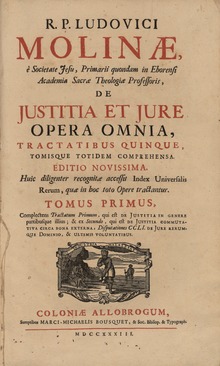Luis de Molina
Luis de Molina (born September 1535 in Cuenca , New Castile, † October 12, 1600 in Madrid ) was a Jesuit theologian and founder of Molinism .
life and work
Luis de Molina studied law in Salamanca (1551 to 1552), philosophy in Alcalá de Henares (1552 to 1553) and Coimbra (1554 to 1558) and theology in Coimbra (1558 to 1562). Jesuit from 1553 , he taught philosophy in Coimbra from 1563 to 1567, theology in Évora from 1568 , and in Cuenca from 1591 . In April 1600, shortly before his death from dysentery, he was appointed as a moral professor at the prominent Jesuit college in Madrid . His head is a relic in Alcalà .
According to Molina, the interaction of divine grace and free will conditions justification and also moral acts ( concursus divinus ). With the idea of a scientia media , Molina tries to unite divine omniscience with free will: God knows beforehand how his freely created creatures will decide under the given conditions; therefore God can create the conditions in such a way that people freely decide according to his advice (on the other hand the preemotio-physica doctrine of the Thomists ).
In his book Liberi arbitrii cum gratiae donis, divina praescientia, providentia, praedestinatione et reprobatione concordia , he taught that divine salvation intentions are dependent on the human will's known will. This view was disputed by the Dominicans as antithomistic, but defended by many Jesuits (Molinists), which resulted in a dispute over mercy , which later continued in the Jansenist disputes.
In 1607 Pope Paul V forbade further discussion until a papal decision; this never happened, so that the "tie" of 1607 is now considered definitive.
Molina also took a position on the state and economy, society and law and morality; he is considered a liberal business ethicist of late Spanish scholasticism . He subjected traditional law to well-founded criticism, turning away from Roman law and taking the position of a natural lawyer and looking for new solutions and derivation structures. The important text De iustitia et iure did not fail to have an effect. Molina - and, based on him, Leonhardus Lessius - mainly continued the secularized doctrine of natural law of the ancestor Hugo Grotius in this regard .
Works
- Liberi arbitrii cum gratiae donis, divina praescientia, providentia, praedestinatione et reprobatione concordia , ed. J. Rabeneck, Madrid 1953.
- De Hispanorum primogeniorum origine ac natura ( la ). Pedro Landri, Lugduni 1588.
-
De iustitia et iure , 6 vols., Cuenca 1593-1609.
- De iustitia et iure ( la ), Volume 1. Marc Michel & C Bousquet, Coloniae Allobrogum 1733.
- De iustitia et iure ( la ), Volume 2. Marc Michel & C Bousquet, Coloniae Allobrogum 1733.
- De iustitia et iure ( la ), Volume 3. Marc Michel & C Bousquet, Coloniae Allobrogum 1733.
- De iustitia et iure ( la ), Volume 4. Marc Michel & C Bousquet, Coloniae Allobrogum 1733.
- De iustitia et iure ( la ), Volume 5. Marc Michel & C Bousquet, Coloniae Allobrogum 1733.
-
Commentaria in primam partem divi Thomae ( la ), 2 vol., Fol. Edition 1593.
- Commentaria in primam divi Thomae partem ( la ). Compagnia Minima, Venetiis 1594.
literature
in order of appearance
- Gerhard Schneemann : The Origin of the Thomist-Molinist Controversy. Study of the history of dogma . Herder, Freiburg 1879.
- Gerhard Schneemann: Further development of the Thomistic-Molinistic controversy. Study of the history of dogma . Herder, Freiburg 1880.
- Wilhelm Weber : Business ethics on the eve of liberalism. The climax and conclusion of the scholastic economic analysis by Ludwig Molina SJ (1535–1600). Aschendorff, Münster 1959.
- Michael Plathow : Molina, Luis de. In: Biographisch-Bibliographisches Kirchenlexikon (BBKL). Volume 6, Bautz, Herzberg 1993, ISBN 3-88309-044-1 , Sp. 43-44.
- Luis de Molina: Divine Plan and Human Freedom. Concordia, disputation 52 . Latin-German. Introduced, translated and commented on by Christoph Jäger , Hans Kraml and Gerhard Leibold (= Philosophical Library . No. 695 ). Meiner, Hamburg 2018, ISBN 978-3-7873-3023-2 (283 pages).
Web links
- Literature by and about Luis de Molina in the catalog of the German National Library
- Luis de Molina at Manus online
- John D. Laing: Middle Knowledge. In: Internet Encyclopedia of Philosophy .
Individual evidence
- ↑ Kirk R. MacGregor: Luis de Molina: The Life and Theology of the Founder of Middle Knowledge . Zondervan Academic, 2015, ISBN 978-0-310-51698-9 ( google.de [accessed April 18, 2020]).
- ^ Jan Dirk Harke : Roman law. From the classical period to the modern codifications . Beck, Munich 2008, ISBN 978-3-406-57405-4 ( floor plans of the law ), § 3 no. 1-2.
| personal data | |
|---|---|
| SURNAME | Molina, Luis de |
| ALTERNATIVE NAMES | Molina, Ludovicus de |
| BRIEF DESCRIPTION | Spanish Jesuit and theologian |
| DATE OF BIRTH | September 1535 |
| PLACE OF BIRTH | Cuenca (Spain) , New Castile |
| DATE OF DEATH | October 12, 1600 |
| Place of death | Madrid |


